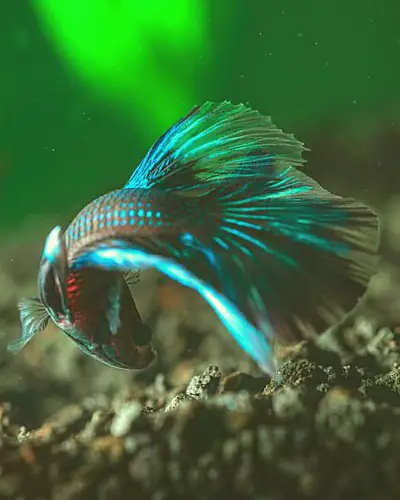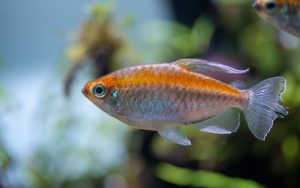Bettas fish are known for their vibrant colors and unique personalities. As a pet fish owner, it can be concerning to see your betta fish not eating and laying at bottom of tank. This behavior can indicate underlying health issues, and addressing this problem as soon as possible is important.
In this article, we’ll explore three common reasons betta fish may exhibit this behavior and provide solutions to help get your fish back to their happy, healthy selves.
Whether you’ve noticed your betta fish lie on bottom of tank after a water change or they’re simply not eating and staying at the bottom of the tank, we’ve got you covered.

We’ll also answer some common questions, such as “Do betta fish lay down?” so you can better understand your pet’s behavior.
So, if you’re a betta fish owner who’s worried about their fish’s health, keep reading to learn more about why your betta fish laying on bottom of tank and not eating and what you can do to help them.
Table of Contents
ToggleIs It Normal For Bettas To Lay On The Bottom Of Tank?
It is not rare for betta fish to lay on the bottom of their small tank. However, this behavior might be a sign of underlying health issues, so it’s important to monitor your fish and their environment closely. There are several causes why a betta fish laying at the bottom of their tank.

One common reason is stress, which can be caused by poor water conditions, nitrate poisoning, overfeeding, or a lack of hiding spots in the tank. Other potential causes include illness, injury, or a swim bladder disorder.
Why Does Betta Fish Not Eating and Laying at Bottom?
Is your betta laying on bottom of tank and not eating? Betta fish not eating and laying at the bottom of their tank can indicate stress, illness, or poor water quality. Common illnesses include fin rot, swim bladder disorder, and fungal or bacterial infections.
High ammonia levels can cause poor water quality, incorrect aquarium water temperature or high pH levels, or inadequate filtration. If you notice this behavior, test the water quality, ensure the fish’s diet is appropriate, and consult a veterinarian if necessary.
Maintaining the ideal temperature is crucial for the well-being of your betta fish. The recommended temperature range is between 75-80 degrees Fahrenheit.
Water is too cold can weaken their immune system and make them vulnerable to diseases, while hot water can cause discomfort and accelerate their aging process. A heater can help regulate the temperature and ensure a comfortable environment for your betta fish.
Reason #1: Poor Water Quality
One of the most frequent reasons betta fish may stop eating and lay at the bottom of their tank is poor water quality or ammonia poisoning. Betta fish require clean and well-oxygenated water to survive, and if the water in their tank is not clean, it can cause stress and illness, leading to a lack of appetite and lethargy.
When the water in a betta fish tank is not clean, it can cause several issues. For example, fish waste can accumulate, leading to high ammonia and nitrites in the water, which can be toxic to fish.
Additionally, suppose the water in the tank needs to be properly filtered. In that case, it can lead to stagnant water, which can cause a lack of oxygen and the growth of harmful bacteria and parasites.
It is crucial to perform regular fish tank water changes. Betta fish tanks should have 25-50% of the water changed once a week, depending on the tank size.
To prevent poor water quality, It is also important to test the aquarium water regularly to ensure that the tank water parameters are within the appropriate range. This includes testing for ammonia, nitrites, nitrates, and pH levels.
If you recently did a water change and noticed that your fighting fish laying at bottom of tank and not eating, the water change may have caused stress.
When changing the water in Bettas fish tank, it is essential to use a water conditioner to remove harmful chemicals and ensure that the water is at the correct temperature. Additionally, ensure that the new water is not drastically different from the old water in terms of pH or hardness.
You can also invest in a good filtration system for your betta fish tank to prevent poor water quality. Filtration helps to remove junk and toxins from the water, which can improve the overall quality of the water and prevent illness.
Reason #2: Overfeeding
Another common reason why betta fish may stop eating, and betta may lay at the bottom of their tank is due to overfeeding. Betta fish have small stomachs and do not require a lot of food. Being overfed can lead to digestive problems and bloating, which can cause them to become lethargic and lose their appetite.
It is important to feed your betta the fair amount of food. Most betta fish need to be fed once or twice a day, and the amount of food should be no larger than the size of their eye.
Choosing the right type of fish food for your betta fish is also important. Betta fish are carnivores and require a special diet plan that is high in protein. You can choose from various foods, including pellets, flakes, and frozen or live foods, but make sure that the food is specifically formulated for betta fish.
If you have been overfeeding your betta fish, you may observe that they are not eating and are lying at the tank bottom. In this case, it is vital to stop feeding them for two or three days and then resume feeding them in smaller portions. You can also switch to a different food source that is easier for them to digest.
Reason #3: Illness
They may be sick betta fish laying bottom of their tank despite good water quality and proper feeding. Several illnesses can cause betta fish to become lethargic and lose their appetite, including fungal infections, bacterial infections, and parasites.
If you suspect your betta fish may be sick, observing them closely for any other symptoms, such as changes in their behavior, appearance, or breathing, is important.
For example, suppose your betta fish is laying on its side at the bottom tank. In that case, it may be a clear signal that they suffer from swim bladder disease, which can be caused by bad water quality, overfeeding, or bacterial infection.
It is essential to consult with your nearby pet store veterinarian who specializes in aquatic animals. They can thoroughly examine your fish and recommend appropriate medication or treatment to diagnose and treat illness in betta fish.
What to Do When Betta Fish is Not Eating?
There are several reasons why your betta fish laying on side at bottom of tank and not eating. Here are some steps to troubleshoot:
- Check the environment: Make sure the water temperature is between 78-80°F (25-27°C) and the tank is quiet and free of stress factors.
- Test the water: Poor water quality can zap your betta’s appetite. Test your tank’s ammonia, nitrite, and nitrate levels and do a water change if necessary.
- Consider the food: Bettas might be picky eaters. Try offering a variety of foods like pellets, flakes, or frozen bloodworms.
- Observe for illness: Look for signs of illness like fin clamped, lethargy, or bloating. If you suspect illness, consult a fish vet.
By addressing these potential causes, you can help get your betta’s appetite back on track.
Prevention is Key for Fish at the Bottom of the Tank.
Prevention is permanently better than cure, and there are very many things that you could do to keep your betta fish happy. First, keeping your betta fish tank clean and well-maintained is important. This includes performing regular water changes, testing the water regularly, and investing in a good filtration system.
Second, giving your betta fish a healthy and balanced diet is important. This includes choosing the right type of food and feeding them the appropriate amount. You can also give your fish a variety of foods, such as live or frozen foods, to provide them with a more diverse diet.
Third, keeping your betta fish tank mates in mind is important. Siamese Bettas are known to be aggressive and may not get along with other fish, so it is crucial to choose tank mates that are compatible with them. Avoid keeping them with other male betta fish or fish that have long, flowing fins, as these can trigger their aggressive behavior.
Fourth, make sure that the water temperature in your betta fish tank is appropriate. Bettas are tropical fish and need a water temperature of 75-82°F. If the tank water temp is too low or too high, it can cause stress and illness, leading to a lack of appetite and lethargy.
Fifth, keep an eye on the behavior of your betta fish. If you find any changes in their behavior, such as laying at the bottom of their tank and not eating, it is important to take action immediately. This includes performing a water change, adjusting their diet, or consulting a veterinarian.
NOTE: Choosing the appropriately sized tank for your betta is crucial as it will impact their quality of life. A minimum tank size of 5 gallon of water is recommended to provide a comfortable and healthy environment for your betta.
Why Is Your Betta Fish Laying On Its Side?
Your betta fish may lie on its side for reasons other than relaxation, sleep, or rest. Some possible reasons include exhaustion, lethargy, digestive issues, breathing problems, swimming difficulties, inadequate tank water flow, or fin loss.
It is important to closely monitor your fish’s behavior and environment and take the necessary steps to address any underlying health issues. If you notice your betta fish lying on its side persistently or exhibiting other signs of illness, consult a veterinarian or a knowledgeable fish expert for advice about this betta swimming sideways behavior.
Are my betta fish sleeping?
Betta fish sleep; during this time, they may appear still with their eyes open due to their lack of eyelids. It is normal for betta fish to lose their color while sleeping as a natural form of self-defense.
They may sleep in various positions, such as curled up like a cat, on their side, or even vertically with their head down. If you observe your betta fish exhibiting this behavior, it is likely that they are sleeping and should not be disturbed.
How To Tell If Your Betta Fish Is Dying?
If your betta fish is dying, you may observe signs of stress such as hiding, laying on the bottom of the aquarium, the appearance of white or brown spots on their body, unusual movements, or disintegration of their fins.
These symptoms can indicate a severe illness that can finally lead to the death of your fish. If you notice any of these symptoms, it is crucial to take immediate action and seek the advice of a veterinarian or a knowledgeable fish expert to help you diagnose and treat the underlying health issues.
How to Treat a Lethargic Betta Fish?
What do i do if my betta fish is not eating? Treating a lethargic betta fish involves identifying the underlying cause and taking appropriate steps to address it. Here are some steps you can take:
1. Check the water quality: Poor water quality can cause stress and illness in fish. Use a water testing kit to inspect the pH, ammonia, and nitrite levels and make any necessary adjustments to the water.
2. Change the water: Perform a partial water change to remove toxins or pollutants affecting the fish’s health.
3. Adjust the temperature: Betta fish thrive in warm water, so ensure that the water temperature is between 78-82°F. Use a fish tank heater to regulate the temperature if necessary.
4. Check the diet: Ensure that your betta fish’s diet is appropriate and that they are fed correctly. Overfeeding can cause digestive issues and stress.
5. Add hiding places: Bettas are known to hide in live plants or ornaments, so adding more hiding places to their tank can help reduce stress.
6. Use medication: If your betta fish displays signs of a bacterial or fungal infection, you may need medication such as epsom salts to treat the illness. Consult a veterinarian or a knowledgeable fish expert to determine the best course of treatment.
In summary, treating a lethargic betta fish involves identifying the underlying reason and taking appropriate steps to address it. By providing a clean and healthy betta environment, a balanced diet, and proper care, you can help your Siamese fighting fish stay healthy and happy.
If the symptoms persist or worsen, it’s essential to seek the advice of your pet store vet or a knowledgeable fish expert to help diagnose and treat your betta fish’s health issues.
Commonly Asked Questions about Betta Not Eating and Staying at Bottom of Tank (FAQs)
Why Is My Betta Fish Lifeless at the Bottom of the Tank?
A betta fish may be lifeless at the bottom of the tank for several reasons, including poor water conditions, stress, illness, or swim bladder disorder.
Why Are My Fish Laying on the Bottom of the Tank Not Moving?
Fish may lay on bottom of the tank and not move due to stress, illness, or poor water quality. It’s crucial to identify the underlying cause and take appropriate steps to address it to help your fish recover and thrive.
When a Betta Fish Is About to Die? Betta Fish Behavior Before Death?
Betta fish may exhibit lethargy, loss of appetite, or gasping for air before they die. They may also become unresponsive, stop moving, or betta laying at the bottom of the fish tank. Identifying any underlying health issues and promptly taking appropriate action is essential.
Why Did Betta Losing Color and Laying on Bottom of Tank?
Betta fish stays at bottom of tank, and lose color may be due to stress, illness, or poor water quality. Identifying the underlying cause and taking appropriate action to help your fish recover and prevent further health issues is important.
Why Is My Fish Laying on Side at the Bottom of the Tank?
Betta Fish Laying on Side Not Eating may be due to stress, illness, swim bladder disorder, or poor water quality. Diagnosing the underlying cause and taking appropriate action to help your fish recover and prevent further health issues is important.
Why Does Betta Fish Laying on Bottom of Tank Breathing Heavy?
Why is my betta fish staying at the bottom of the tank and not eating? Betta Fish Laying on Side but Not Dead may be due to stress, illness, or poor water quality. Diagnosing the underlying cause is crucial, and taking appropriate action to help your fish recover and prevent further health issues.
Why Is My Betta Fish Laying on Its Side on the Bottom?
Why is my fish staying at the bottom of the tank and not eating? Betta fish laying on their side on the bottom of tank may be due to stress, illness, swim bladder disorder, or poor water quality. Diagnosing the underlying cause and taking appropriate action to help your fish recover and prevent further health issues is important.
Why is my betta fish not eating?
why betta fish not eating? betta not eating food due to stress, illness, poor water quality, or inappropriate food. Assess the tank conditions, check for signs of illness, and offer varied, high-quality food.
What to do if betta fish is not eating?
what to do when your betta fish is not eating? Don’t panic! Bettas may refuse food due to stress, water quality, or illness. Check tank temp, test water, and offer small portions of fresh food. If worried, consult a fish vet.
Final Thoughts
So, why my betta fish not eating? In conclusion, if you notice your betta fish not eating and laying at bottom, it’s important to take action and address the matter as soon as possible. By understanding the common reasons betta-fighting fish may exhibit this behavior, such as water quality issues or illness, you can take the necessary steps to help your fish recover and thrive. Remember to regularly monitor your betta fish’s behavior and environment, including their diet, water temperature, and cleanliness of your betta tank.
And if you notice your betta laying on bottom of tank after a water change or showing signs of illness, don’t hesitate to seek the advice of a veterinarian or a knowledgeable fish expert. By staying informed and proactive, you can ensure your betta fish stays healthy & happy for years. So don’t let betta fish not eating and laying at the bottom of the tank stress you out – take action and enjoy the rewarding experience of being a betta fish owner!
You might also like
- 7 Warning Signs of Dying Betta Fish You Need to Know
- Bettas Swim Bladder Disease: (7 Symptoms & Best Treatment)
- How to Tell If Your Betta Is Dying of Old Age? (7 Clear Signs)
- 5 Reasons Why Do Betta Fish Play Dead (Uncovered & Solved)
- Why Is My Betta Not Moving? 5 Common Reasons (Solved)
- Betta Fish Laying on Side But Not Dead: 3 Causes & Treatment
- Sick Betta Fish Laying Bottom:(7 Possible Causes & Fixes)
- Is My Betta Fish Dead or Sleeping: (7 Signs to Look Out For)
- Betta Fish Losing Color and Laying on Bottom of Tank: (Solved)
- Can Betta Eat Tropical Fish Flakes! (3 Better Alternatives)
- Betta Fish Overfed 101: Recognizing Symptoms and Quick Fix
- Betta Fish Swimming Sideways 101: (Main Causes & Quick Fix)




